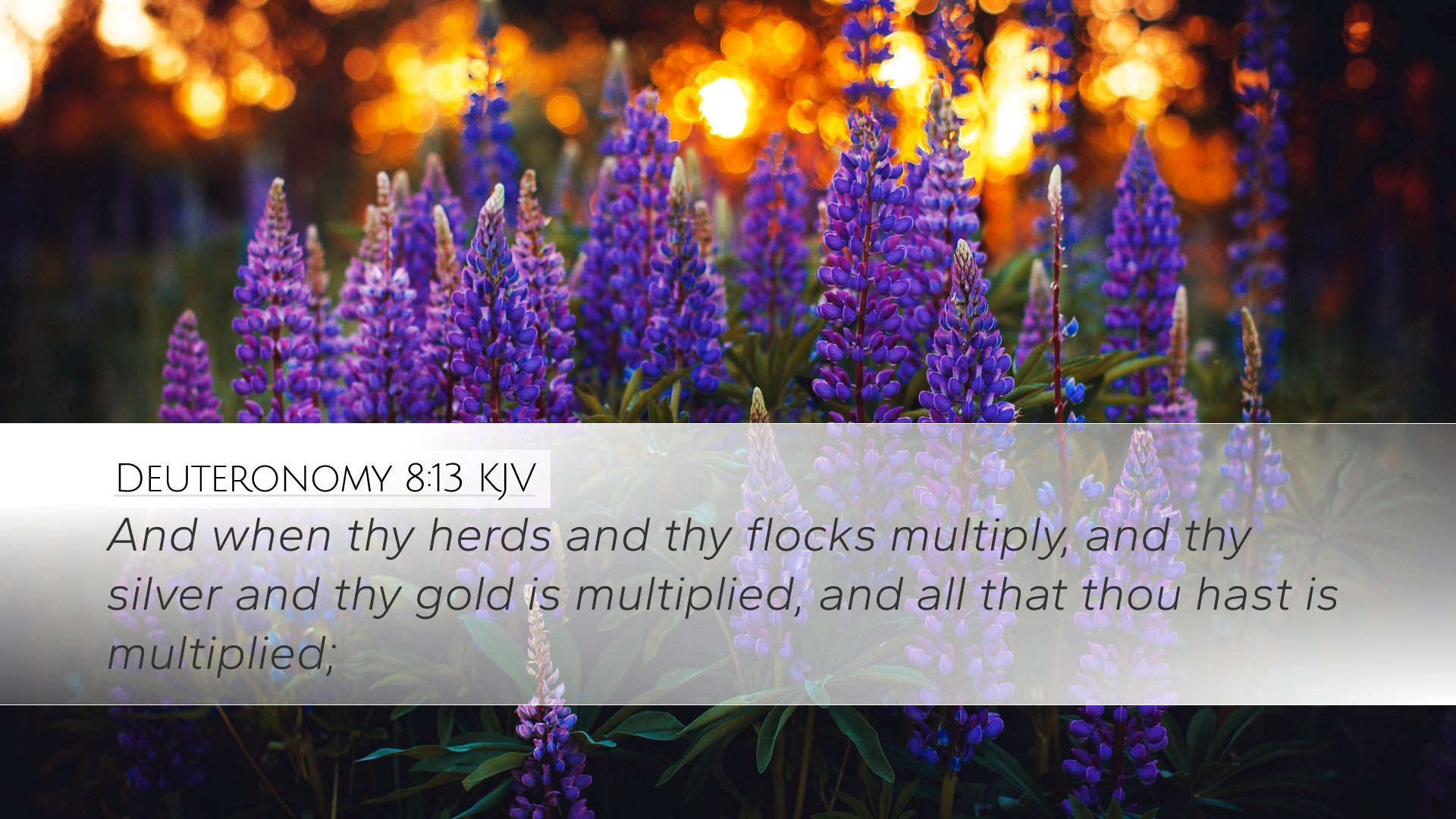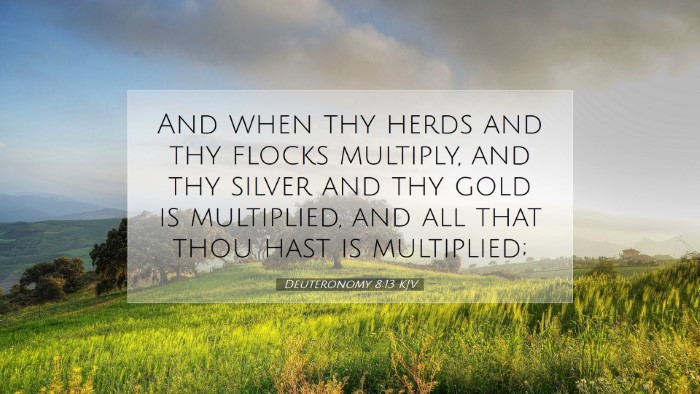Commentary on Deuteronomy 8:13
Bible Verse: "And when your herds and flocks multiply, and your silver and gold are multiplied, and all that you have is multiplied."
Introduction
The verse from Deuteronomy 8:13 serves as a crucial reminder for both ancient Israel and contemporary readers about the blessings that accompany obedience to God. It reflects on the prosperity that comes from divine favor, emphasizing the importance of recognizing the source of one’s wealth and blessings.
Exegesis of Deuteronomy 8:13
As we break down this verse, we see an expansion of the themes introduced in the broader passage of Deuteronomy 8, which warns against forgetting God in times of prosperity. The multiplication of herds, flocks, silver, gold, and all that one possesses highlights the overflowing blessings of God.
Contextual Importance
- Historical Context: The Israelites are reminded of their reliance on God as they are about to enter the Promised Land. Their prosperity is not merely a result of their own hard work but fundamentally tied to their covenant relationship with God.
- Thematic Connection: This verse connects intimately with the teachings on humility and gratitude found throughout the book of Deuteronomy. It emphasizes the necessity of acknowledging God as the true source of prosperity.
Commentary Insights
1. Matthew Henry’s Perspective:
Matthew Henry emphasizes the significance of God’s blessings in our lives, interpreting the multiplication of herds and wealth as indicators of divine favor. He stresses the necessity for believers to remain humble and not allow their prosperity to lead them away from their dependence on God. Henry warns that in times of abundance, there is a particular danger of forgetting God, thus challenging believers to actively remember their spiritual roots.
2. Albert Barnes’ Analysis:
Albert Barnes notes that this verse is part of a larger admonition concerning the nature of wealth and the responsibilities that come with it. He points out that material abundance can often lead to a false sense of security which can distance one from spiritual dependence. Barnes highlights the idea of accountability - that God expects to be remembered and honored amidst prosperity and material wealth.
3. Adam Clarke’s Commentary:
Adam Clarke discusses the symbolism of flocks and herds in ancient cultures, linking them to God’s provision and the sustenance of the community. Clarke cautions against the tendency to attribute success to one’s own efforts, reminding readers that God is the ultimate giver of all good gifts. He further emphasizes the spiritual implications of this verse, reminding the faithful not to allow success to lead to pride but to maintain a posture of thanksgiving and reverence towards God.
Theological Reflections
This verse invites theological reflection on the nature of God’s providence and the integrity of the believer’s response to material blessings. It raises several key points for deeper consideration:
- Divine Sovereignty: The multiplication of wealth is a reflection of God’s sovereign control over creation and covenantal promises to His people.
- Human Responsibility: Acknowledging God in times of plenty requires intentional action and reflection. It is not sufficient to simply enjoy blessings; one must actively remember their source.
- Spiritual Warfare: Prosperity can often lead to complacency, which may tempt one away from faithful living. Vigilance in spiritual disciplines is necessary to combat the allure of materialism.
Practical Applications
For pastors, students, theologians, and Bible scholars, this commentary on Deuteronomy 8:13 provides a robust foundation for understanding how to navigate both personal and communal prosperity:
- Encouragement of Gratitude: In sermons or teachings, emphasize the importance of giving thanks for all blessings, encouraging congregations to practice gratitude actively.
- Teaching on Wealth Stewardship: Develop teachings that address the biblical view on the responsible use of wealth, including tithing, generosity, and community support.
- Fostering a Culture of Remembrance: Create initiatives or spiritual practices within faith communities that help believers regularly reflect on God’s past provision and faithfulness.
Conclusion
Deuteronomy 8:13 is a poignant reminder of the interconnectedness of material blessings and spiritual responsibility. As believers, we are called to acknowledge and honor God amidst our prosperity, ensuring our hearts remain aligned with His purposes and grateful for His provisions. Through the insights gleaned from public domain commentaries, we see the timeless relevance of this verse in prompting serious reflection on our relationship with God in the context of our achievements and wealth.


